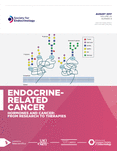The emerging roles of DNA methylation in the clinical management of prostate cancer
- Institute of Molecular Medicine, Trinity College Dublin, Ireland
- 1Center for Cancer Research, National Cancer Institute, 6116 Executive Blvd, Bethesda, MD 20892, USA
- (Requests for offprints should be addressed to A S Perry; Email: perryan{at}tcd.ie)
Abstract
Aberrant DNA methylation is one of the hallmarks of carcinogenesis and has been recognized in cancer cells for more than 20 years. The role of DNA methylation in malignant transformation of the prostate has been intensely studied, from its contribution to the early stages of tumour development to the advanced stages of androgen independence. The most significant advances have involved the discovery of numerous targets such as GSTP1, Ras-association domain family 1A (RASSF1A) and retinoic acid receptor β2 (RARβ2) that become inactivated through promoter hypermethylation during the course of disease initiation and progression. This has provided the basis for translational research into methylation biomarkers for early detection and prognosis of prostate cancer. Investigations into the causes of these methylation events have yielded little definitive data. Aberrant hypomethylation and how it impacts upon prostate cancer has been less well studied. Herein we discuss the major developments in the fields of prostate cancer and DNA methylation, and how this epigenetic modification can be harnessed to address some of the key issues impeding the successful clinical management of prostate cancer.
- © 2006 Society for Endocrinology












